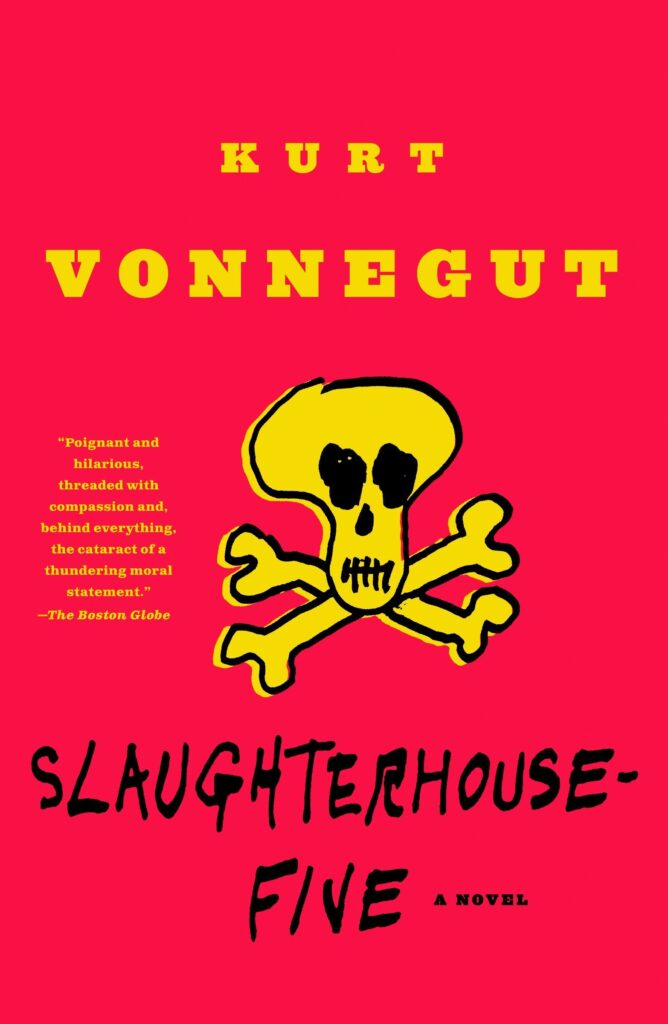
Today we’re delving into a book that’s as strange as it is intriguing. I’m talking about “Slaughterhouse-Five” by Kurt Vonnegut. Now this book is anything but ordinary—it’s a crazy blend of sci-fi, satire, and war narrative that’s guaranteed to leave you thinking long after you’ve turned the last page.
I first came across this gem in a quirky old bookstore, tucked between a romance novel and a cookbook. Little did I know then, it would become one of the most memorable reads of my life.
Book Summary of Slaughterhouse-Five
“Slaughterhouse-Five” is a wild ride through time and space, following the life of Billy Pilgrim, our unconventional protagonist. Billy isn’t your typical war novel hero—instead, he’s a time-traveling, alien-abducted optometrist who has “come unstuck in time.” The narrative, just like Billy’s life, is non-linear and jumps back and forth between different periods.
The book starts with Billy’s capture during the Battle of the Bulge and subsequent imprisonment in Dresden, where he survives the horrific firebombing as a POW. From there, we are catapulted into different parts of Billy’s life—from his mundane post-war suburban existence to his odd experiences on the alien planet of Tralfamadore, where he’s displayed in a zoo.
Vonnegut brilliantly interweaves these diverse threads, creating a rich tapestry of satire, science fiction, and profound reflections on the human condition and the nature of war. “Slaughterhouse-Five” is a testament to the absurdity of life and the destructiveness of war, seen through the lens of a man who experiences reality in a way no one else does.
Book Review of Slaughterhouse-Five
“Slaughterhouse-Five” is a book that defies categorization. It’s part war narrative, part science fiction, part existential philosophy—all bound together by Vonnegut’s unique style and wit. This unusual blend is what makes the book so fascinating. It’s like Vonnegut took a bunch of different genres, threw them into a blender, and out came this extraordinary novel.
Vonnegut’s handling of serious themes like the destructiveness of war, the inevitability of death, and the illusion of free will is masterful. He uses his unusual narrative structure to great effect, presenting a disjointed and chaotic world that mirrors the insanity of war. The experiences of Billy, especially his time on Tralfamadore, offer a fresh perspective on life and our place in the universe.
The book’s humor and satirical tone prevent it from becoming too heavy despite its serious themes. Vonnegut’s dry wit and sharp observations often shine through, keeping the reader engaged and entertained. This balance between seriousness and humor, reality and fantasy, is part of what makes “Slaughterhouse-Five” such a standout novel.
Slaughterhouse-Five Rating
My rating for “Slaughterhouse-Five”: 8.5 out of 10. This book is a wild ride that forces you to think and reflect, but it might be a bit too unconventional for some.
Amazon Rating: 4.4 out of 5.
Goodreads Rating: 4.09 out of 5.
About the Author: Kurt Vonnegut
Kurt Vonnegut was a master of contemporary American literature, renowned for his distinctive blend of satire, black comedy, and science fiction. His works often delve into the human condition, exploring themes of philosophy, society, and morality. Born in Indianapolis, Vonnegut had quite an adventurous early life.
He attended Cornell University before enlisting in the US Army in 1943. He was deployed to Europe during World War II and was captured during the Battle of the Bulge. His experiences as a prisoner of war in Dresden profoundly influenced his work, most notably “Slaughterhouse-Five”.
In a career spanning over 50 years, Vonnegut published fourteen novels, three short-story collections, five plays, and five nonfiction works. His breakthrough came with the publication of “Slaughterhouse-Five” in 1969, a novel whose anti-war sentiment resonated with readers amidst the Vietnam War.
After its release, it shot to the top of The New York Times Best Seller list, catapulting Vonnegut into fame. Even after his death, his work continues to be celebrated for its unique blend of satire, black comedy, and deep insights into American society.




